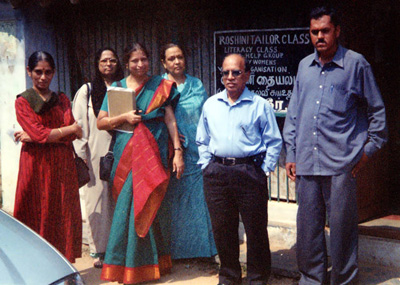CECHE’s Tobacco-Control Program in South India Lights Up

A joint project with the Chennai-based NGO Roshni, CECHEís Tobacco Control Communications Program in S. India is breathing new life into Pattur, a small village that has been dependant on the production of beedis (small unfiltered cigarettes) for income and has a high prevalence of smoking, even among children. Launched in September 2004, the two-year effort aims to raise awareness of the health hazards of smoking in this village of 2,000 near Chennai and to train selected members of the population, especially women, in skills suitable for non-tobacco trades.
Training and Communications
The program employs print and electronic media to reach its audience and promote its goals. These include the formation of self-help groups and the introduction of microcredit programs, non-formal education, vocational training, income-generating skills, and health and hygiene classes and camps.
Progress over the past eight months has been encouraging. In October 2004, for example, three self-help groups (SHGs) were formed with 20 women each from families involved in beedi rolling, and members were trained to conduct weekly group meetings on smoking and tobacco use cessation. By December, these 60 women had begun to enroll local girls and women in a six-month tailoring and embroidery program organized by the Roshni Tailoring Centre, an established school helping independent women transition from beedi rolling to a more healthy, profitable profession. Roshni also conducts tailoring classes at Pattur and enables women to get diplomas in this discipline and jobs in the garment industry. In addition, the NGO has helped the SHGs activate and use bank accounts, enabling them to save money using the microcredit system, which extends small loans to poor people for self-employment projects that generate income and help support themselves and their families. Today, all three SHGs have significant savings accounts and are able to offer internal loans.
In the first two months of 2005, following the devastating tsunami in Asia, the Pattur SHGs embroidered clothes and made pickles, pappads (Indian lentil snacks) and incense sticks for sale at the Roshni Centre. The proceeds of Rs.20,000 ($500) were used to purchase and distribute basic necessities such as rice, water pots, floor mats and bed linens to the tsunami victims at Kalpakkam.
In March of this year, Dr. C. Kolappan, deputy director of the Tuberculosis Research Centre in Chennai, delivered a mesmerizing speech in Pattur about the harmful effects of tobacco on the human body using visual aids that had a profound impact on the 250 attendees.
In April, preparations began for a periodic health screening and treatment program for Patturís beedi laborers, with the hiring of medical staff and the printing of health cards for families involved in beedi rolling. To help raise awareness among the younger members of the community, oratorical contests, as well as poster and skit competitions on the hazards of tobacco, have been held for middle- and high-school children.
On May 31, in observation of World No-Tobacco Day, Roshni screened two short films starring top Tamil actors conveying the message of "no-tobacco" in Pattur. The NGO also held street fairs to mark the occasion, and in collaboration with REACH international, an organization for tuberculosis control, distributed pamphlets on smoking as a risk factor for tuberculosis.
Going forward, CECHE and Roshni plan to:
- Set up a clinic and hygiene center, and conduct medical and health camps that perform periodic follow-up
- Set up a facility in the health center for counseling sessions to discourage beedi making and smoking
- Engage more groups in the community in tobacco-control campaigns
- Enhance vocational training, job searches and placements, and wean people from tobacco rolling
- Arrange nutrition and hygiene sessions with demonstrations on cooking healthy food
- Participate in the World Health Organizationís biannual QUIT and WIN campaign
- Adopt science-based methods for treating tobacco dependence.
Evaluation of Impact and Anticipated Results
The Tobacco Control Communications Program in S. India will assess the impact of its educational and training activities on both use cessation among beedi smokers and the increase in non-tobacco trades among beedi rollers. The effect of pamphlets and other educational materials on recognition of the hazards of smoking will also be assessed through random interviews and discussions with residents. Periodic check-ups at the health center, as well as regular follow-ups, will help to determine the degree of awareness created among the beedi smokers.
The number of people who receive anti-smoking counseling and who quit smoking are anticipated to increase, and the program is expected to lead to substantial health and economic benefits among Pattur’s population as it promotes the reduction of beedi-smoking-related morbidity and mortality in South India.
[Next News Article]